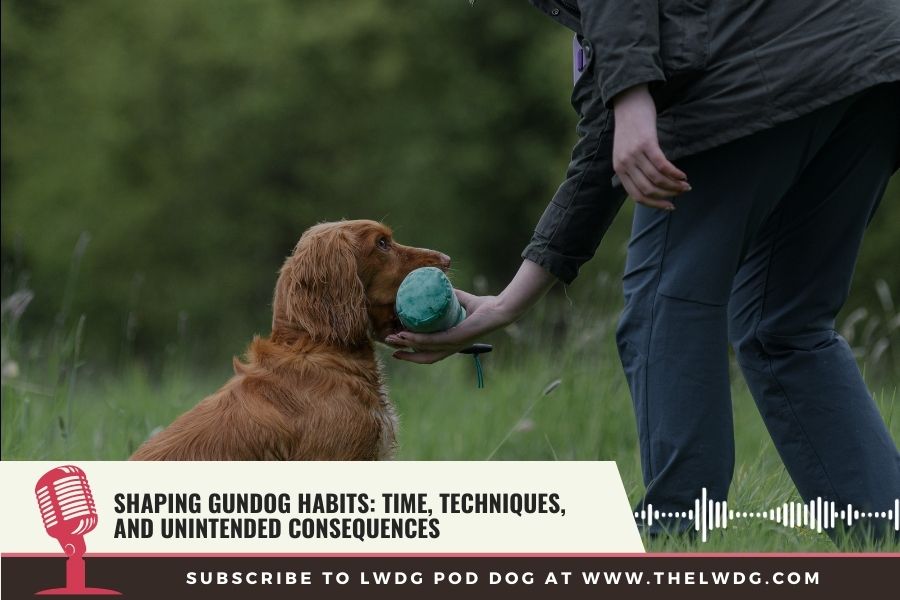Training a gundog is a journey, one filled with opportunities for growth, bonding, and yes, occasional frustrations. The heart of this journey lies in understanding and shaping the habits of our canine companions. Whether we’re talking about an eager Labrador Retriever or a tenacious English Springer Spaniel, each breed is a creature of habit. These behaviours, learned over time, become deeply ingrained in their character, defining their reliability and competence as working dogs.
In this podcast and blog post, our goal is to equip you, the gundog handler, with an understanding of the principles and techniques involved in shaping your gundog’s habits. We will tackle the thorny issue of time commitment and set realistic expectations for training schedules. We will also delve into the potential for unintended consequences in training and offer effective strategies to correct and prevent these.
It’s important to remember that every gundog is unique, with its personality, strengths, and challenges. While training techniques can be broadly applied, they need to be tailored to your dog’s individual needs for the most effective results. So, strap in and prepare to delve into some of the intricacies of gundog training.
Podcast Episode:

Understanding the Time Commitment for Successful Gundog Training
When embarking on the journey of training your gundog, it’s essential to manage your expectations and understand that this isn’t a race. Gundog training is a marathon, not a sprint. It takes time, persistence, and lots of patience.
Setting Realistic Expectations and Planning Training Schedules
Firstly, set yourself up for success by establishing a consistent and realistic training schedule. Unlike what quick-fix dog training videos might have you believe, effectively training a gundog doesn’t happen overnight. It’s a gradual process. You’re teaching your dog a whole new set of skills and habits, and this takes time.
Your training schedule should be a careful balance of structure and flexibility, consistent enough to establish a routine, but adaptable to accommodate your gundog’s individual pace of learning. Training shouldn’t be rushed. Quality always trumps quantity in dog training, and a well-trained gundog is worth the time investment.
 Subscribe To LWDG Pod Dog Today
Subscribe To LWDG Pod Dog Today
The Pillars of Training: Patience and Consistency
If there are two key qualities every gundog handler needs to master, they are patience and consistency. With patience, you can better understand your gundog’s individual learning pace, catering to their unique needs and capabilities. Patience will also save you and your gundog from unnecessary frustration.
Consistency, on the other hand, forms the basis for habit formation in your gundog. Dogs, being creatures of habit, respond best to regular training sessions, uniform commands, and consistent rewards. By being consistent, you’re reinforcing desirable behaviours, and over time, these will become second nature to your gundog.
Never forget, gundog training isn’t a one-time event, but a continuous process that shapes your relationship with your four-legged companion. Your shared experiences during training will form the foundation of an unshakeable bond between you and your gundog. So, embrace the journey and cherish every step of the way.
The Unintended Consequences of Gundog Training
In the world of gundog training, it’s not all smooth sailing. You may encounter roadblocks along the way, some of which come in the form of unintended consequences or unwanted habits. But fret not, every challenge is an opportunity for learning and growth, both for you and your gundog.
Common Unwanted Habits in Gundog Training
One of the pitfalls handlers often encounter in gundog training is unwanted habits. These might include excessive excitement during retrieves, disobedience to commands, or problematic social behaviours. Each of these behaviours, if left unaddressed, can disrupt the training process and impede your gundog’s performance in the field.
Strategies to Tackle Unwanted Habits
The key to addressing these challenges is early identification and intervention. As soon as you notice a problematic behaviour, take steps to correct it. Letting it slide might only reinforce the unwanted habit, making it harder to eliminate down the line.
Addressing these behaviours often involves methods such as positive reinforcement, where you reward your gundog for displaying the correct behaviour. Redirection can also be effective, turning your dog’s attention away from the unwanted action towards a more desirable one. In some cases, if the behaviour persists, professional help may be necessary.
While unintended consequences might seem like stumbling blocks, they are simply part of the journey. Each challenge provides an opportunity for you and your gundog to learn, adapt, and grow stronger together. After all, successful gundog training is not just about the destination, but the journey itself.
Habit Formation Timeframes in Gundogs
Habit formation in gundogs doesn’t happen in a flash; it is a process that takes time. The duration varies considerably depending on the individual dog, the specific habit in question, and the consistency of training. As a general guide, you might expect simpler behaviours to take a few weeks to establish, whereas more complex habits could require several months of consistent training.
Influencing Factors in Habit Formation
Numerous factors can influence how quickly your gundog picks up new habits. These might include the breed of your dog (as some breeds are naturally more inclined towards certain behaviours), their age, previous experiences, and the consistency and effectiveness of your training methods. Recognising these factors can help you set realistic expectations and adapt your training approach to your gundog’s individual needs.
Wrapping Up Our Podcast and Gundog Training Journey
In summary, the journey to shape gundog habits is a multidimensional one. It demands an understanding of canine psychology, the application of effective training techniques, a significant time commitment, and a preparedness to handle unintended consequences. Tailoring your training approach to your gundog’s unique needs will be crucial for success.
At the heart of it all, patience and consistency are the cornerstones of effective gundog training. It’s a gradual, sometimes challenging, but ultimately rewarding process. Your dedication will eventually yield a reliable, well-trained working dog who not only excels at their tasks but also enjoys performing them.
As we conclude this blog post, I encourage you not to just listen and read this guide but to apply these insights to your own gundog training. Use these tools, learn from your experiences, and watch the beautiful bond between you and your gundog grow. Here’s to the many exciting adventures that await you and your gundog companion.
What’s Your Gundog Goddess Style?
Who’s ready for some extra fun? Discover your unique approach to training with our “Which Gundog Goddess Are You?” quiz. You don’t want to miss this one
Join Our Online Community!
Jump on our email list for free tips and insights delivered to your inbox monthly. No spam - just quick bites of value.


